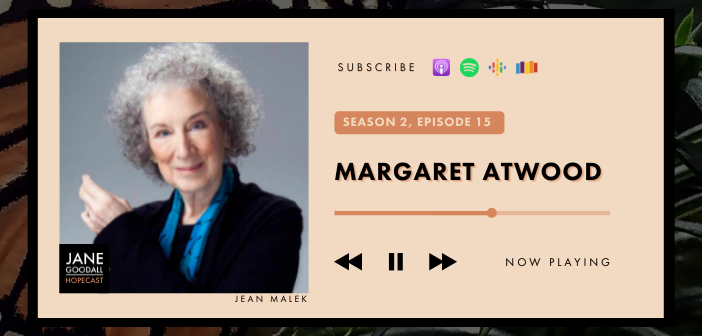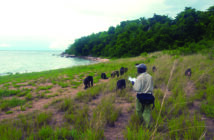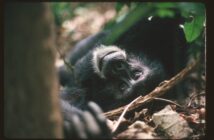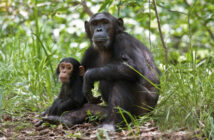Full Transcript:
Jane Goodall (00:05):
When my mother and I arrived in Kigoma, for the first time we’d been told by the British expats living there that we absolutely had to take a cook with me. “It’ll be perfect,” they said, “Jane and her mother will have a super of cook.” Well, he did wonders with the simple food we had, mostly stuff from tins that we took from Kigoma with some fresh vegetables and fruits from the nearby village. After four months, Mom had to leave. She had to go back to England. Mom was leaving just before Christmas. Well, a month before, and she and Dominic spent ages planning the feast that he would offer me on Christmas night. She’d even found plum pudding in a tin.
Jane Goodall (00:51):
I arrived in camp as usual, just as darkness fell, the little table where we had eaten our meals was laid with a plate, fork and knife, a tin of corned beef and a tin opener. The lamp wasn’t lit, nor was the campfire. Dominic had passed out. He’d had such a wonderful time drinking his [Pombie 00:01:14] with his friends. I just had to sit and laugh, especially as perhaps with some twinge of shame, he’d managed to pick some wildflowers and put them in a glass on the table. I had the planned meal the next evening. Probably tasted even better.
Speaker 2 (01:36):
We are all connected. All our voices matter and it’ll take all of our bold talents and strengths to create a healthier planet.
Speaker 3 (01:44):
Our mother, our one and only.
Speaker 4 (01:46):
I aspire to change the world too, because of the hope she gave me.
Speaker 5 (01:56):
The Earth is beautiful.
Speaker 6 (01:56):
She devoted her life-
Speaker 7 (01:56):
Together, we can save [crosstalk 00:01:57].
Speaker 5 (01:56):
Together we can, together we will.
Jane Goodall (01:58):
What is your greatest reason for hope? I’m Jane Goodall, and this is the Hope Cast. Today I’m spending time with celebrated author, inventor and environmentalist Margaret Atwood. Margaret’s written over 50 books including The Handmaid’s Tale, a renowned dystopian novel that’s been adapted into a film and award-winning television series. She’s also a dedicated climate activist and uses her platform to raise environmental awareness. In addition to exploring these themes in her writing, she has a series of green policies that she and her staff use as well as online resources publicly available on her website.
Jane Goodall (02:52):
I’m so looking forward to our discussion on how storytelling can both educate and inspire audiences and make a positive impact on our world. I hope you enjoy this hopeful conversation with Margaret Atwood.
Margaret Atwood (03:16):
Hello, my name is Margaret Atwood and it’s my very great pleasure to be talking today to the one and only Jane Goodall. Hello, Jane.
Jane Goodall (03:26):
Well, hello Margaret. I’m Jane and you are the one and only Margaret as well. So we are both talking to one and only.
Margaret Atwood (03:34):
Yes, we are. Good for us. So when I’m writing a novel, I always decide what year the person is born, then I know what was happening to them when they were 10, what was happening in the world when they were 20 and when they were 30. So, you were born in 1934, and that means in the Depression. Then when you were six or five, along came World War II. So you were definitely a war child. You went through the war. Where were you living then?
Jane Goodall (04:08):
Well, just before the war, like six months before, my father took a house in Le Touquet in France. I was there with my sister, Mom, and her friend and two kids. We’d been now three months when war broke out and we had to leave, then came where I’m speaking from now, my grandmother’s house, which is now a family house.
Jane Goodall (04:31):
Then as soon as we got here to Barmouth, I spent all my time watching animals in the garden and the cliffs above the sea. And when we were in France, my friend Sally and I were the same age and we both remember this great big expanse of water and watching frogs. We saw a photograph the other day, and it was like a quarter-size swimming pool, but when you are little, I don’t know… But before we go on with me, it’s your turn now.
Margaret Atwood (04:59):
I was born in 39, so two months after war broke out. In fact, my whole early childhood was spent in that period. My childhood was similar to yours in the animal watching department, although possibly more so because we were in the Quebec north woods. Did a lot of frog watching and turning over of logs in case there might be a newt or a snake. My dad was a forest entomologist and an early conservationist, very early, the period when people thought you were kind of lunatic if you were interested in those things.
Margaret Atwood (05:44):
So, early Sierra Club and very early knowledge of ecosystems and very against, for instance, wholesale spraying of forests for insect pests. Always thought it was a bad idea like that. So I sort of grew up that way, but I don’t imagine that your family was saying, “Jane, we want you to grow up and go off and study chimpanzees.” Now, they have all these questions they want us to answer. Three of them are about this weird thing which is one’s legacy. Do you ever think about that, Jane?
Jane Goodall (06:24):
Well, when I saw the question, I thought about it. It says, “Who’s legacies do you want to build on?” The people I thought of, people like Rachel Carson, Nelson Mandela, Martin Luther King, Mahatma Gandhi…
Margaret Atwood (06:41):
Well, I can quite easily say my dad. I suppose both of us would like the same thing, but I don’t consider it any one person’s legacy, it’s going to have to be a group effort, and that would be, let us have a habitable planet and let us have a planet with a lot of biodiversity. And let us try not to lose any more species because we’ve already lost a lot.
Jane Goodall (07:05):
We have. We’re in the middle of the sixth great extinction.
Margaret Atwood (07:08):
I know, it’s terrifying and very dispiriting, which brings us to the next thing that people always ask about. I bet they ask you too, and that’s the “hope” word. Where do you get hope?
Jane Goodall (07:22):
I think you should start that one off.
Margaret Atwood (07:25):
Well, okay. So my answer usually is, “Why not?” If you’re not hopeful, things are going to get less hopeful, and if you are hopeful, that may generate more hope and actually inspire people to take action because if you don’t have any hope, then there’s no use doing anything.
Margaret Atwood (07:49):
So people who say, “We’re doomed,” I’m just not interested in that. It doesn’t generate any sort of positive activity. My model is always the Black Death. What did people do during the Black Death? Some of them were hopeful and tried to take positive action and others just thought, “Well, it’s the end of the world. We might as well just party.”
Jane Goodall (08:12):
The great, good thing I think is when you do something and you see it’s made a difference, which it will, you feel good. That’s great. Then you want to do more, to feel better. It’s like the program we have around Gombi, and now in 104 villages in Tanzania. We call it community-led conservation, started in 1994 with the 12 villages just around the chimp park. It was a group of local Tanzanians going into these villages and sitting down and asking the people what they thought we could do to make their lives better, mainly restoring fertility to the overused farmland and better health and education. Now we have scholarships to give girls a chance of secondary education, micro-credit programs so women can start their own small businesses, family planning information, and they know that good education is a way to rise out of poverty.
Jane Goodall (09:12):
So we’ve seen a reduction in poverty, whereas in the late eighties, I flew over Gombi, which had been part of this great equatorial forest belt, and by the late eighties, it was a tiny island of forests surrounded by totally bare hills, more people living there than the land could support. But now the trees have come back and the people understand that protecting the environment isn’t just for wildlife. That’s in six other African countries now.
Margaret Atwood (09:44):
That’s amazing and so essential because if there isn’t something in it for the people on the ground, they won’t do it. And why should they?
Jane Goodall (09:54):
If they don’t buy into the conservation, there’s no long term future. The stories about the resilience of nature, the stories about the indomitable human spirit, stories about what children are doing… And so I’m sure you agree with me that if you want to change somebody’s mind, it doesn’t really help to attack them and point fingers at them and tell them they’re bad. You’ve got to find a way to reach the heart: stories.
Margaret Atwood (10:23):
Yes. Well, we expect you at the head of the parade, Jane, carrying the banner, which that’s hope, but you’re there already, so you don’t have to actually be in a parade.
Margaret Atwood (10:36):
They also want to know where have you found the most meaning in your life? What has been the most rewarding?
Jane Goodall (10:45):
Well, it was incredibly rewarding when the chimpanzees lost their fear of me after four months, when you overcome the fear of an animal. I mean, I have lunch every day under my beech tree and a little robin comes along and he’ll now sit on my hand to eat his little suet crumbs. I’m afraid I’m a bit vegan, but he’s not. But anyway. Having a baby was incredibly rewarding, watching him grow up and comparing him in my mind with the little chimps. Now, it’s your turn.
Margaret Atwood (11:23):
My turn? Well, I find it a very difficult question to answer because a lot of things have been rewarding, but I don’t think that’s why you do them. And some of the things that we have done have been not rewarding because people did not at first receive them well. I think it’s rewarding right now that I’m still working. I think that’s always been rewarding, so I’m happy and grateful about that.
Margaret Atwood (11:48):
Now they want to talk about the “feminism” word, which for me is a sub-branch of human rights. That is a conversation that has been ongoing and I think anybody who went through World War II and the period leading up to it and the period after it is quite aware of those issues because we have seen many dictatorships come and go, and we are now living in a period when some of them seem to be on the rise again, which is very worrisome to me.
Margaret Atwood (12:22):
But it has changed a lot since the fifties. Or forties, actually, women were very active, but it’s the usual thing with revolutions and wars. Women are very instrumental, very helpful and then they’re told, “Oh, that’s enough of you. We’re finished with that. Back to the bungalow, and here’s a washing machine to make you feel happier.” You would’ve been in your twenties when that came along and probably got the full force of it whereas I was a little bit younger and we just didn’t pay any attention to it. So were you told that you couldn’t do things because you were female?
Jane Goodall (13:00):
Yeah, I was, but of course when I wanted to go and live with wild animals, everybody laughed at me. But you see, I had this amazing mother and a wonderful family. The scientists were kind of scornful at first of the findings of this young girl. And, oh, I only got credit because the Geographic came in and they only came in with money because I had nice legs. If that was said now, it would be shocking. It’s true.
Jane Goodall (13:42):
Margaret, I understand that your new book, Burning Questions, is coming out next month. What is it about?
Margaret Atwood (13:49):
Oh, it’s a collection of essays from 2004 to roughly now. It’s the third such collection, there are two earlier ones, so it’s the third in the set. It’s just stuff that I was writing during those years, which were pretty tumultuous years. Environmental questions were front and center for me. I find myself, because we went through a big pile of paper to get these essays out and decide which ones to put in, I noticed myself making quite a few speeches about this and telling people that if they killed the oceans, they’ll stop breathing. That’s my short form of why they should do something because people usually, in general, are slow to action until it’s impacting them.
Jane Goodall (14:40):
Well, that’s it. You know, the weather patterns have changed everywhere.
Margaret Atwood (14:44):
They have. And of course, one of the net results of that is going to be food shortages because people are used to growing certain things in certain places and if you have fires, floods and droughts and extreme temperatures, particularly hot ones, you’re just not going to get the harvest.
Jane Goodall (15:04):
And that’s why we’ve got all these climate refugees.
Margaret Atwood (15:07):
That is exactly right. It causes social unrest, it causes wars, it causes climate refugees because people’s places where there is to living are being destroyed not just through other people but through the weather. Do you remember going to Sudbury, Ontario and releasing a trout into the lake?
Jane Goodall (15:30):
Yes, of course I do.
Margaret Atwood (15:33):
I loved that picture of you doing that because I remember Sudbury from the forties when it was like the moon. It had been over logged, it had been burnt over and then it had all of this acid smoke falling on it and nothing, I mean nothing, grew and it was a citizen effort. They just decided that they did not want to live without nature, any nature. And they sat about planting a forest. First they stuffed some lime and soil into the cracks and these very black rocks and they planted things that come back after fires such as blueberries. Now they have a forest.
Margaret Atwood (16:15):
The hardest thing to fix was the water because it always is, and shorelines are the hardest of all to bring back, but they managed to do it. And there was you releasing a live trout into this water that had been completely lethal for years and years, and years, and years.
Jane Goodall (16:36):
And it was because of that that I wrote a whole chapter about Sudbury and we’re about to make an IMAX film in which Sudbury will be the reason for hope based on the resilience of nature.
Margaret Atwood (16:48):
Yes. And also the efforts of people who really did make a difference because they decided to do that.
Jane Goodall (16:53):
Yeah, like rescuing animals from the brink of extinction.
Margaret Atwood (16:57):
Exactly right. What are you going to do next? What’s your next big thing?
Jane Goodall (17:03):
There’s an awful lot we need to change. Haven’t talked about the rights of animals. We need to ban factory farming. We need to ban unsustainable commercial fishing. We’re killing soil with pesticides and herbicides. I mean, it’s terrible.
Margaret Atwood (17:20):
That’s the real reason for buying organic. It’s not that it’s going to kill you not to, it’s that we need to regenerate the organic soil because it holds carbon and dead soil doesn’t.
Jane Goodall (17:34):
Regenerative farming is the way to go and permaculture.
Margaret Atwood (17:38):
I’m with you, Jane. So I’m very excited about the fact that you can make bricks out of mushrooms. You can grow them out using food waste, and then you can bake them. You don’t have to cut down any trees.
Jane Goodall (17:54):
Yep. Also, they’re making plastic from mushroom as well.
Margaret Atwood (17:58):
Yes. They’re making also plastic from just general food waste too, so I think these are going to come on stream. Let us hope.
Jane Goodall (18:07):
Yep, absolutely. In your work with gender equality, there’s a tribe in one of the Latin American countries, and I was talking to the chief. He said, “Our tribe is like an eagle and one wing is male, the other wing is female. And only when the wings are equal will our tribe fly high.”
Margaret Atwood (18:29):
That is a wonderful thought. I will tell that to Equality Now, which works around the world on laws having to do with gender. It’s a good saying. Wonderful.
Jane Goodall (18:44):
Well, it’s been great meeting you and talking to you and I look forward to seeing your latest book.
Margaret Atwood (18:49):
I’m going to go look up your legs right away.
Jane Goodall (18:55):
Good old legs.
Jane Goodall (18:56):
(Music) The main message is that every single one of us matters just like in the rainforest. Every single one of us has some role to play in this complex life and every single one of us make some every single day. You cannot live through a day and not make some difference on the planet. And we have a choice” do we want to make the plays better or don’t we care?
Jane Goodall (19:51):
Feel hopeful and inspired to act with the Jane Goodall Hope Cast by subscribing on Apple podcasts, Spotify, Stitcher, Google Podcasts and anywhere podcasts are found.
Jane Goodall (20:08):
I’m your host, Jane Goodall. The Jane Goodall Hope Cast is produced by the Jane Goodall Institute. Our production partner is FRQNCY Media. Michelle Khouri is our executive producer, Enna Garkusha is our producer and Matthew Earnest Filler is our editor and sound designer. Our music is composed and performed by Ruth Mendelson with additional violin tracks from Angie Shyr. Sound design and music composition for the Conservation Chorus is by Matthew Earnest Filler.






